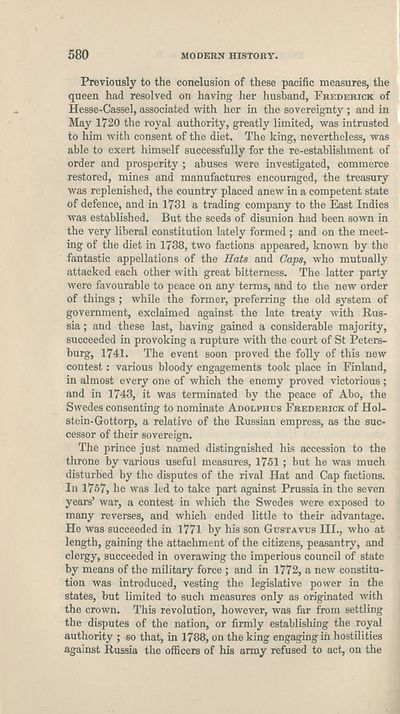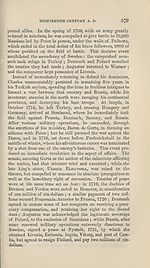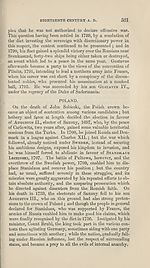Download files
Complete book:
Individual page:
Thumbnail gallery: Grid view | List view

580
MODERN HISTORY.
Previously to the conclusion of these pacific measures, the
queen had resolved on having her husband, Frederick of
Hesse-Cassel, associated with her in the sovereignty ; and in
May 1720 the royal authority, greatly limited, was intrusted
to him with consent of the diet. The king, nevertheless, was
able to exert himself successfully for the re-establishment of
order and prosperity ; abuses were investigated, commerce
restored, mines and manufactures encouraged, the treasury
was replenished, the country placed anew in a competent state
of defence, and in 1731 a trading company to the East Indies
was established. But the seeds of disunion had been sown in
the very liberal constitution lately formed ; and on the meet¬
ing of the diet in 1738, two factions appeared, known by the
fantastic appellations of the Hats and Gaps, who mutually
attacked each other with great bitterness. The latter party
were favourable to peace on any terms, and to the new order
of things ; while the former, preferring the old system of
government, exclaimed against the late treaty with Rus¬
sia ; and these last, having gained a considerable majority,
succeeded in provoking a rupture with the court of St Peters¬
burg, 1741. The event soon proved the folly of this new
contest: various bloody engagements took place in Finland,
in almost every one of which the enemy proved victorious ;
and in 1743, it was terminated by the peace of Abo, the
Swedes consenting to nominate Adolphus Frederick of Hol¬
stein-Gottorp, a relative of the Russian empress, as the suc¬
cessor of their sovereign.
The prince just named distinguished his accession to the
throne by various useful measures, 1751 ; but he was much
disturbed by the disputes of the rival Hat and Cap factions.
In 1757, he was led to take part against Prussia in the seven
years’ war, a contest in which the Swedes were exposed to
many reverses, and which ended little to their advantage.
He was succeeded in 1771 by his son Gustavus III., who at
length, gaining the attachment of the citizens, peasantry, and
clergy, succeeded in overawing the imperious council of state
by means of the military force ; and in 1772, a new constitu¬
tion was introduced, vesting the legislative power in the
states, but limited to such measures only as originated with
the crown. This revolution, however, was far from settling
the disputes of the nation, or firmly establishing the royal
authority ; so that, in 1788, on the king engaging in hostilities
against Russia the officers of his army refused to act, on the
MODERN HISTORY.
Previously to the conclusion of these pacific measures, the
queen had resolved on having her husband, Frederick of
Hesse-Cassel, associated with her in the sovereignty ; and in
May 1720 the royal authority, greatly limited, was intrusted
to him with consent of the diet. The king, nevertheless, was
able to exert himself successfully for the re-establishment of
order and prosperity ; abuses were investigated, commerce
restored, mines and manufactures encouraged, the treasury
was replenished, the country placed anew in a competent state
of defence, and in 1731 a trading company to the East Indies
was established. But the seeds of disunion had been sown in
the very liberal constitution lately formed ; and on the meet¬
ing of the diet in 1738, two factions appeared, known by the
fantastic appellations of the Hats and Gaps, who mutually
attacked each other with great bitterness. The latter party
were favourable to peace on any terms, and to the new order
of things ; while the former, preferring the old system of
government, exclaimed against the late treaty with Rus¬
sia ; and these last, having gained a considerable majority,
succeeded in provoking a rupture with the court of St Peters¬
burg, 1741. The event soon proved the folly of this new
contest: various bloody engagements took place in Finland,
in almost every one of which the enemy proved victorious ;
and in 1743, it was terminated by the peace of Abo, the
Swedes consenting to nominate Adolphus Frederick of Hol¬
stein-Gottorp, a relative of the Russian empress, as the suc¬
cessor of their sovereign.
The prince just named distinguished his accession to the
throne by various useful measures, 1751 ; but he was much
disturbed by the disputes of the rival Hat and Cap factions.
In 1757, he was led to take part against Prussia in the seven
years’ war, a contest in which the Swedes were exposed to
many reverses, and which ended little to their advantage.
He was succeeded in 1771 by his son Gustavus III., who at
length, gaining the attachment of the citizens, peasantry, and
clergy, succeeded in overawing the imperious council of state
by means of the military force ; and in 1772, a new constitu¬
tion was introduced, vesting the legislative power in the
states, but limited to such measures only as originated with
the crown. This revolution, however, was far from settling
the disputes of the nation, or firmly establishing the royal
authority ; so that, in 1788, on the king engaging in hostilities
against Russia the officers of his army refused to act, on the
Set display mode to:
![]() Universal Viewer |
Universal Viewer | ![]() Mirador |
Large image | Transcription
Mirador |
Large image | Transcription
| Antiquarian books of Scotland > Education > Elements of universal history on a new and systematic plan > (600) |
|---|
| Permanent URL | https://digital.nls.uk/127587340 |
|---|
| Description | Thousands of printed books from the Antiquarian Books of Scotland collection which dates from 1641 to the 1980s. The collection consists of 14,800 books which were published in Scotland or have a Scottish connection, e.g. through the author, printer or owner. Subjects covered include sport, education, diseases, adventure, occupations, Jacobites, politics and religion. Among the 29 languages represented are English, Gaelic, Italian, French, Russian and Swedish. |
|---|

